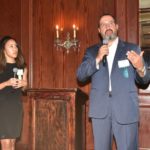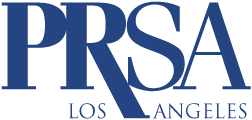By Keith Pillow, APR, MBA

Attendees: Alan Caldwell, Sabrina Hudson, Dianne Bergman, Vicky Lelash and Hugo Balta
On Tuesday, June 28, dozens of PRSA-LA members gathered at Maggiano’s Little Italy at The Grove for the chapter’s first luncheon program, in nearly a decade, to hear a highly-informative presentation, “Recognizing and Addressing the Undetected Crisis: Unconscious Bias and the PR Practitioner,” from keynote speaker Hugo Balta, senior director of multicultural content for ESPN Digital and Print Media.
A sought-after speaker and thought leader on the subject of unconscious bias, and also the author of the recently-published book Leadership Habits, Balta began his presentation by defining unconscious bias – an inflexible positive, negative, or unknown belief about a category of people. In many cases, such bias manifests itself as a “blindspot” that is not always negative, but can result from one’s personal experiences and beliefs. Then Balta launched into an in-depth discussion of the three components of unconscious bias: safety, familiarity and success. When considering diversity and inclusion in the workplace, it is generally categorized by gender, sexual orientation or ethnicity. However, it far exceeds that. It also includes one’s values and opinions, which in some instances can lead to persistent stereotypes.

Speaker Hugo Balta, ESPN; Moderator Sabrina Hudson, LA Business Journal
In offering an unconscious bias example that surprised many attendees, Balta conducted an image search of the term “CEO” using Google’s powerful search engine. The first several pages of organic results yielded mostly photos of Caucasian male CEOs at companies around the world. The first female image to be found was not of Marissa Mayer of Yahoo, Meg Whitman of HP, or Mary Barra of General Motors. Instead, it was of CEO Barbie from Mattel. According to Balta, while that may be astonishing to many, especially in the year 2016, it is yet another illustration of unconscious bias at work, and indicative of how prevalent and pervasive the issue is in Corporate America and international business environments.
In the end, unconscious bias can lead to “willful ignorance” which, in turn, may result in discrimination — a cancer to brands that can derail corporate reputation and financial performance. However, research has proven that diversity is good for business…on multiple fronts. Balta advised PR practitioners to be self-aware and to identify how their experiences have shaped their current beliefs, and how those very same experiences can help close the gap in combating unconscious bias and demonstrating relevancy.
Check out a slideshow recap below.
Video Credit: Marshall Thompson For More information visit PRVideo.Tv








